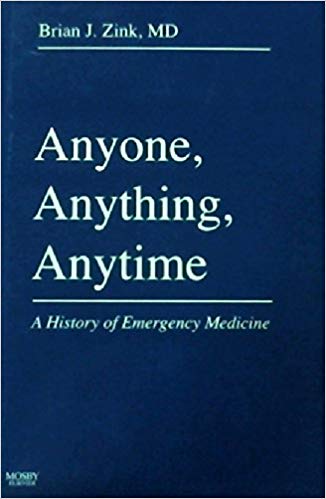The story of emergency medicine as a specialty is an interesting one.
Emergency departments -- initially focused on trauma* care -- began appearing in the early 20thc.
*In the medical field "trauma" refers to injuries like falls or gunshots, vs "medicine."
(1/n) https://twitter.com/DenverEMed/status/1194293626471235584">https://twitter.com/DenverEMe...
Emergency departments -- initially focused on trauma* care -- began appearing in the early 20thc.
*In the medical field "trauma" refers to injuries like falls or gunshots, vs "medicine."
(1/n) https://twitter.com/DenverEMed/status/1194293626471235584">https://twitter.com/DenverEMe...
However, there were no emergency room doctors at the time, and wouldn& #39;t be for more than half a century (2/n).
Initially doctors from other parts of the hospital would take emergency room call. Interns and residents (which were just starting to become a thing) were quickly assigned responsibility for the emergency room.
It wasn& #39;t a desirable duty (3/n).
It wasn& #39;t a desirable duty (3/n).
For a long time, prestige in medicine was tied to owning your our practice, and/or to an academic position in a field like psychiatry or surgery. Emergency medicine didn& #39;t fit into that. The least powerful/successful people were stuck with it (4/n).
These included trainees, doctors just starting out who couldn& #39;t yet support themselves with their office patients, or people who would not or could not work a standard job -- including abrasive and incompetent physicians (5/n).
This of course became a self-reinforcing dynamic, familiar to anyone who has lived in a bad neighborhood. Being unrewarding and not prestigious, successful doctors avoided working in the emergency room, which helped keep it marginal and undesirable (6/n).
But some people fell in love with it! They continued working in the emergency room because they liked it. Something which must have been extremely difficult to explain to colleagues, friends, and family, given the ED& #39;s rep as employer of last resort (7/n).
So they dealt with this by deciding to get emergency medicine recognized as a specialty by the AMA. Which was, objectively, crazy and impossible (8/n.)
(Sorry, the American Board of Medical Specialties, not the AMA. Anyway, the powers that be! (9/n))
The ABMS was incorporated in 1933. But virtually ALL the main specialties we recognize today were codified in the first 15 years! (10/n)
In the 30 years that followed, the AMBS recognized a handful of sub-specialties (Nuclear Medicine, Allergy & Immunology) and grudging bestowed recognition on the ABSOLUTE MAJORITY of physicians working in primary care, by recognizing the discipline of Family Medicine (11/n).
The contrast with family practice is notable; compared to recognizing hundreds of thousands of physicians practicing in the traditional family doctor role, EM pioneers wanted recognition for a then-tiny group of weirdos who wanted to make a career out of a punishment detail(12/n)
They wanted recognition as a specialty 30 years after the ABMS made a regular habit of recognizing new specialties.
And that wasn& #39;t the only objection (13/n.)
And that wasn& #39;t the only objection (13/n.)
A specialty, by definition, specializes in something. But to skeptics, EM did not seem to specialize in any recognized area, neither in patients (like pediatrics, or gynocology), or in an organ system (like cardiology or neurology) or…(14/n)
… in a specialized, exclusive set of skills (like radiology or surgery.)
Everything they did someone else did. So what was new? (15/n)
Everything they did someone else did. So what was new? (15/n)
(Physicians still argue about this, 40 years after EM was recognized as a specialty. FWIW, my take is that we specialize in a place (like anesthesia, or critical care medicine.) Some places in the system have unique patients and problems & require unique-ish skills (16/n).)
But that turned out to be the key to breaking in to the clubhouse -- the very fact that we did overlap with everybody.
The population in the 70s was growing, aging, & acquiring higher expectations (& lawyers.)
Enter one of the great forces in human history: laziness (17/n.)
The population in the 70s was growing, aging, & acquiring higher expectations (& lawyers.)
Enter one of the great forces in human history: laziness (17/n.)
The way an emergency room worked at the time was that one of your private patients came in, and you were called and had to come to the emergency dept. During your clinic hours. In the middle of the night. On holidays. Sitting down to dinner…(18/n.)
It would be lovely, of course, if the emergency room doctor could handle most problems themselves, calling you only if the patient needed to be admitted. But to do that, you need more than scared interns or moonlighting psychiatrists.
You need professionals (19/n).
You need professionals (19/n).
And that was how the pioneers of EM made the case to the establishment. Not: we will produce masters of resuscitation. Not: we will improve survival from heart attacks & strokes with better-trained front-line doctors.
No, the pitch was: EM doctors will let you sleep! (20/n)
No, the pitch was: EM doctors will let you sleep! (20/n)
I often think of this when I& #39;m frustrated w a referring doctor or a consultant who I feel is asking me to do their job. Galling as it is to think about, doing their job is how we became the last core specialty recognized by the medical establishment (21/n).
Pioneers like Rosen built the specialty from the ground up. They wrote textbooks. They opened residency programs. They radically ratcheted up the standard of care expected when you crash through the door of the ER.
I can& #39;t describe how grateful I am they paved the way (22/22).
I can& #39;t describe how grateful I am they paved the way (22/22).

 Read on Twitter
Read on Twitter



